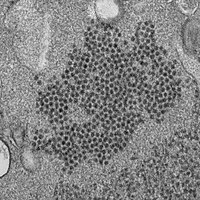
Photo from wikipedia
Enterovirus D68 (EV-D68) can cause mild to severe respiratory illness and is associated with a poliomyelitis-like paralytic syndrome called acute flaccid myelitis (AFM). Most cases of EV-D68-associated AFM occur in… Click to show full abstract
Enterovirus D68 (EV-D68) can cause mild to severe respiratory illness and is associated with a poliomyelitis-like paralytic syndrome called acute flaccid myelitis (AFM). Most cases of EV-D68-associated AFM occur in young children who are brought to the clinic after the onset of neurologic symptoms. ABSTRACT Enterovirus D68 (EV-D68) can cause mild to severe respiratory illness and is associated with a poliomyelitis-like paralytic syndrome called acute flaccid myelitis (AFM). Most cases of EV-D68-associated AFM occur in young children who are brought to the clinic after the onset of neurologic symptoms. There are currently no known antiviral therapies for AFM, and it is unknown whether antiviral treatments will be effective if initiated after the onset of neurologic symptoms (when patients are likely to present for medical care). We developed a “clinical treatment model” for AFM, in which individual EV-D68-infected mice are tracked and treated with an EV-D68-specific human-mouse chimeric monoclonal antibody after the onset of moderate paralysis. Mice treated with antibody had significantly better paralysis outcomes compared to nonspecific antibody-treated controls. Treatment did not reverse paralysis that was present at the time of treatment initiation but did slow the further loss of function, including progression of weakness to other limbs, as well as reducing viral titer in the muscle and spinal cords of treated animals. We observed the greatest therapeutic effect in EV-D68 isolates which were neutralized by low concentrations of antibody, and diminishing therapeutic effect in EV-D68 isolates which required higher doses of antibody for neutralization. This work supports the use of virus-specific immunotherapy for the treatment of AFM. It also suggests that patients who present with AFM should be treated as soon as possible if recent infection with EV-D68 is suspected.
Journal Title: Antimicrobial Agents and Chemotherapy
Year Published: 2022
Link to full text (if available)
Share on Social Media: Sign Up to like & get
recommendations!